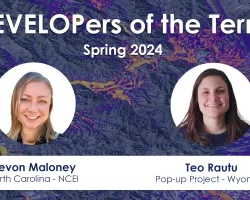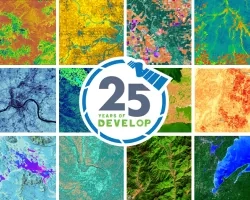DEVELOP Alumni Spotlight
A decade ago, after growing up in Vermont, Patrick Saylor graduated from high school in New Mexico during a major drought, which turned his attention to a major ecological issue and ignited his interest in water resources research. He chose to pursue his newfound interest at Dartmouth College in 2012. Since Dartmouth didn’t have a water resources major, he chose to double major in Earth Sciences and Fluid Mechanics, working to gain an understanding of Earth’s hydrological concerns. During his time at Dartmouth, Patrick spent five years studying Alaskan climate reconstruction using ice cores, and even managed to summit Denali, the highest peak in North America. From there, Patrick began exploring new peaks in the world of Earth observations. He found DEVELOP and joined the NASA Jet Propulsion Laboratory (JPL) DEVELOP team in the Spring of 2020. Soon afterward, he accepted a second opportunity at JPL, working virtually due to the COVID-19 pandemic as the Project Lead on DEVELOP’s Alaska Transportation & Infrastructure project in the Summer of 2020.
“My favorite part was that [the DEVELOP-related] work directly affected community issues. This inspired my continued job search, and I focused on applied sciences with clear community values in water resources.”
When looking back on his DEVELOP work, Patrick noted that his project experiences afforded him the opportunity to complete rigorous programming and documentation, geospatial analysis, and remote sensing skills that he continues to use daily in his career. When asked about his DEVELOP experience, Patrick stated, “my favorite part was that this work directly affected community issues. This inspired my continued job search, and I focused on applied sciences with clear community values in water resources.” In addition to the technical skills gained in his DEVELOP work, Patrick felt that his most valuable learning came through the growth of his project management and team collaboration. Learning to set individual goals and communicate them to his team for project success was a valuable opportunity to contribute to his greater professional career.
After his DEVELOP work, Patrick could utilize his skills and interests in water resources as an associate scientist at the National Center for Atmospheric Research, this time moving to Colorado to work on the WRF-Hydro model, an open-source community model. He currently works to predict flash floods, assess future water supplies for drought areas, and conducts hydrological research using remote sensing, Python programming, and data analysis skills – all directly translated from his DEVELOP experience. Patrick feels that this work “doesn’t really feel like work,” and he enjoys the varied nature of his current role. Some days he compares the performance of different water models in assessing water resource dynamics, or builds new analysis tools, while other days, he gets to teach workshops to state and federal groups working to incorporate the WRF-Hydro model into their decision-making processes. He enjoys tackling Earth’s hydrological issues and values the opportunity to continue positively impacting society.
“push beyond your comfort zone and challenge yourself to overcome your weaknesses and insecurities in DEVELOP’s very supportive environment.”— Patrick Saylor |
Though he has moved on to a new role, Patrick has not forgotten the lessons learned during his DEVELOP work. His advice for DEVELOPers transitioning into the professional world is to “stay in touch with your cohort, mentors, and supervisors. Your cohort will go on to do incredible things and can create great friendships. Your mentors and supervisors are amazing resources. Reach out to past DEVELOPers, as they are all out doing interesting work and can help guide your professional directory.” Patrick has had great conversations with fellow DEVELOP alumni and valued their guidance when choosing his next opportunities. It was through DEVELOP that Patrick felt he was able to explore the range of applied science careers, and his project work gave him both the confidence and tools to pursue his career goals. His final word of advice for current DEVELOPers is “push beyond your comfort zone and challenge yourself to overcome your weaknesses and insecurities in DEVELOP’s very supportive environment.”


